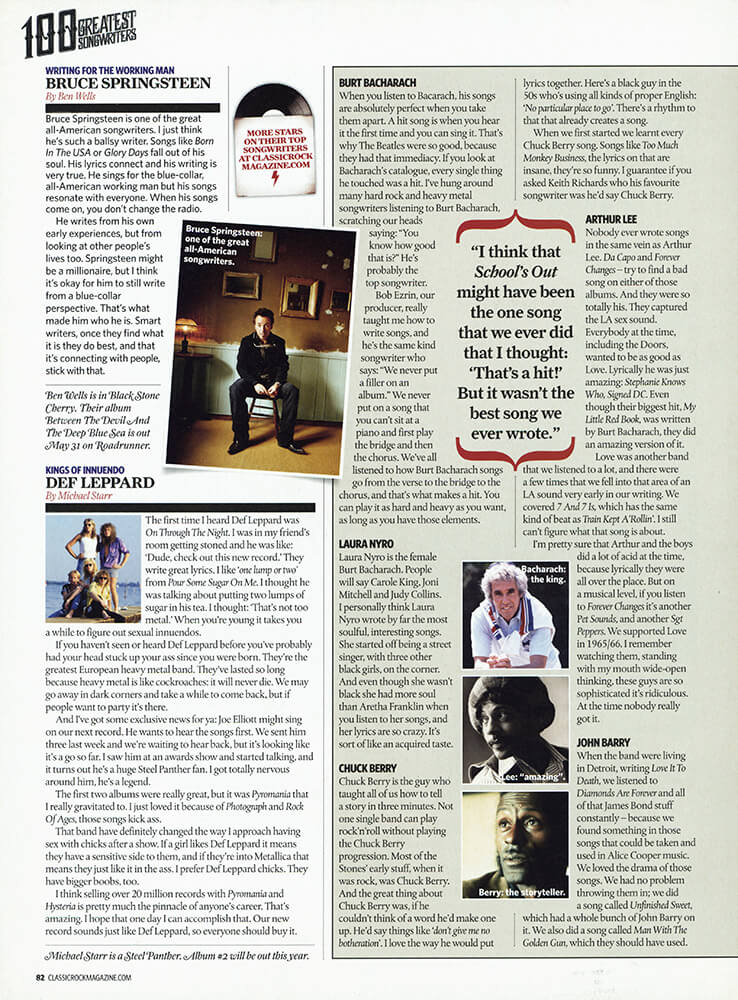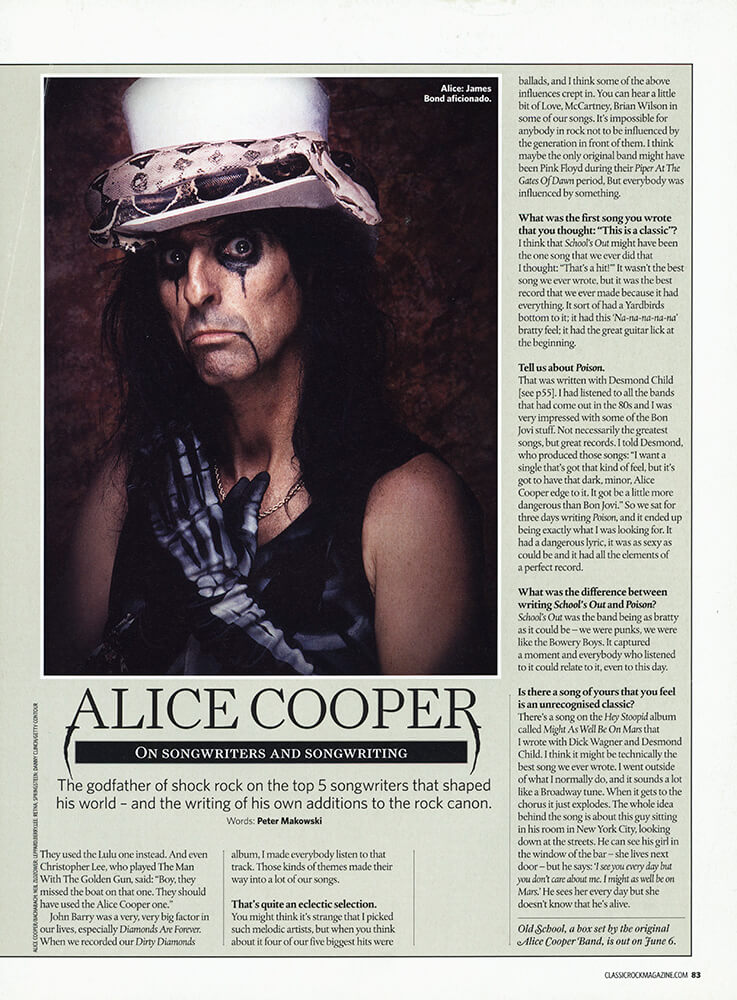Article Database

Classic Rock
May 2011
Alice Cooper On Songwriters and Songwriting
The godfather of shock rock on the top 5 songwriters that shaped his world — and the writing of his own additions to the rock canon.
Author: Peter Makowski
BURT BACHARACH
When you listen to Bacharach, his songs are absolutely perfect when you take them apart. A hit song is when you hear it the first time and you can sing it. That's why The Beatles were so good, because they had that immediacy. If you look at Bacharach's catalogue, every single thing he touched was a hit. I've hung around many hard rock and heavy metal songwriters listening to Burt Bacharach, scratching our heads saying: "You know how good that is?" He's probably the top songwriter.
Bob Ezrin, our producer, really taught me how to write songs, and he's the same kind songwriter who says: "We never put a filler on an album. "We never put on a song that you can't sit at a piano and first play the bridge and then the chorus. We've all listened to how Burt Bacharach songs go from the verse to the bridge to the chorus, and that's what makes a hit. You can play it as hard and heavy as you want, as long as you have those elements.
LAURA NYRO
Laura Nyro is the female Burt Bacharach. People will say Carole King, Joni Mitchell and Judy Collins. I personally think Laura Nyro wrote by far the most soulful, interesting songs. She started off being a street singer, with three other black girls, on the corner. And even though she wasn't black she had more soul than Aretha Franklin when you listen to her songs, and her lyrics are so crazy. It's sort of like an acquired taste.
CHUCK BERRY
Chuck Berry is the guy who taught all of us how to tell a story in three minutes. Not one single band can play rock'n'roll without playing the Chuck Berry progression. Most of the Stones' early stuff, when it was rock, was Chuck Berry. And the great thing about Chuck Berry was, if he couldn't think of a word he'd make one up. He'd say things like 'don't give me no botheration'. I love the way he would put lyrics together. Here's a black guy in the 50s who's using all kinds of proper English: 'No particular place to go'. There's a rhythm to that that already creates a song.
When we first started we learnt every Chuck Berry song. Songs like Too Much Monkey Business, the lyrics on that are insane, they're so funny. I guarantee if you asked Keith Richards who his favourite songwriter was he'd say Chuck Berry.
ARTHUR LEE
Nobody ever wrote songs in the same vein as Arthur Lee. Da Capo and Forever Changes — try to find a bad song on either of those albums. And they were so totally his. They captured the LA sex sound. Everybody at the time, including the Doors, wanted to be as good as Love. Lyrically he was just amazing: Stephanie Knows Who, Signed DC. Even though their biggest hit, My Little Red Book, was written by Burt Bacharach, they did an amazing version of it.
Love was another band that we listened to a lot, and there were a few times that we fell into that area of an LA sound very early in our writing. We covered 7 And 7 Is, which has the same kind of beat as Train Kept A' Rollin'. I still can't figure out what that song is about.
I'm pretty sure that Arthur and the boys did a lot of acid at the time, because lyrically they were all over the place. But on a musical level, if you listen to Forever Changes it's another Pet Sounds, and another Sgt Peppers. We supported Love in 1965/66. I remember watching them, standing with my mouth wide-open thinking, these guys are so sophisticated it's ridiculous. At the time nobody really got it.
JOHN BARRY
When the band were living in Detroit, writing Love It To Death, we listened to Diamonds Are Forever and all of that James Bond stuff constantly —because we found something in those songs that could be taken and used in Alice Cooper music. We loved the drama of those songs. We had no problem throwing them in; we did a song called Unfinished Sweet, which had a whole bunch of John Barry on it. We also did a song called Man With The Golden Gun, which they should have used. They used the Lulu one instead. And even Christopher Lee, who played The Man With The Golden Gun, said: "Boy, they missed the boat on that one. They should have used the Alice Cooper one."
John Barry was a very, very big factor in our lives, especially Diamonds Are Forever. When we recorded our Dirty Diamonds album, I made everybody listen to that track. Those kinds of themes made their way into a lot of our songs.
That's quite an eclectic selection.
You might think it's strange that I picked such melodic artists, but when you think about it four of our five biggest hits were ballads, and I think some of the above influences crept in. You can hear a little bit of Love, McCartney, Brian Wilson in some of our songs. It's impossible for anybody in rock not to be influenced by the generation in front of them. I think maybe the only original band might have been Pink Floyd during their Piper At The Gates Of Dawn period, But everybody was influenced by something.
What was the first song you wrote that you thought: "This is a classic"?
I think that School's Out might have been the one song that we ever did that I thought: "That's a hit!" It wasn't the best song we ever wrote, but it was the best record that we ever made because it had everything. It sort of had a Yardbirds bottom to it; it had this 'Na-na-na-na-na' bratty feel; it had the great guitar lick at the beginning.
Tell us about Poison.
That was written with Desmond Child. I had listened to all the bands that had come out in the 80s and I was very impressed with some of the Bon Jovi stuff. Not necessarily the greatest songs, but great records. I told Desmond, who produced those songs: "I want a single that's got that kind of feel, but it's got to have that dark, minor, Alice Cooper edge to it. It's got to be a little more dangerous than Bon Jovi." So we sat for three days writing Poison, and it ended up being exactly what I was looking for. It had a dangerous lyric, it was as sexy as could be and it had all the elements of a perfect record.
What was the difference between writing School's Out and Poison?
School's Out was the band being as bratty as it could be — we were punks, we were like the Bowery Boys. It captured a moment and everybody who listened to it could relate to it, even to this day.
Is there a song of yours that you feel is an unrecognised classic?
There's a song on the Hey Stoopid album called Might As Well Be On Mars that I wrote with Dick Wagner and Desmond Child. I think it might be technically the best song we ever wrote. I went outside of what I normally do, and it sounds a lot like a Broadway tune. When it gets to the chorus it just explodes. The whole idea behind the song is about this guy sitting in his room in New York City, looking down at the streets. He can see his girl in the window of the bar — she lives next door — but he says: 'I see you every day but you don't care about me. I might as well be on Mars.' He sees her every day but she doesn't know that he's alive.
Old School, a box set by the original Alice Cooper Band, is out on June 6.




